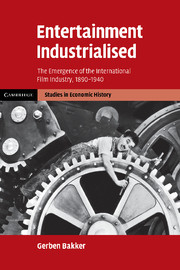Book contents
- Frontmatter
- Contents
- List of figures
- List of tables
- Acknowledgements
- Prologue
- 1 Introduction
- Part I The rise of entertainment
- Part II The rise of the international film industry
- Part III Entertainment Industrialised
- 9 International market integration: firms versus trade
- 10 Industrialising the discovery process
- 11 At the origins of increased productivity growth in services
- 12 Epilogue: after television
- Bibliography
- Index
12 - Epilogue: after television
Published online by Cambridge University Press: 08 July 2009
- Frontmatter
- Contents
- List of figures
- List of tables
- Acknowledgements
- Prologue
- 1 Introduction
- Part I The rise of entertainment
- Part II The rise of the international film industry
- Part III Entertainment Industrialised
- 9 International market integration: firms versus trade
- 10 Industrialising the discovery process
- 11 At the origins of increased productivity growth in services
- 12 Epilogue: after television
- Bibliography
- Index
Summary
This book has investigated three main themes: how motion pictures industrialised spectator entertainment, how a quality race changed the structure of the international entertainment market, and what effect this had on economic and productivity growth. The investigation has resulted in seven claims. First, cinema industrialised live entertainment by automating it, standardising it and making it tradeable. Second, this industrialisation process was largely demand-led. Third, it was the index case for the subsequent industrialisation of other services. Fourth, in a process of dynamic product differentiation old formats reinvented themselves when new formats arrived: theatre changed after vaudeville, vaudeville changed after cinema and motion pictures changed after television. Fifth, tradeability integrated national entertainment markets into an international one. Sixth, a quality race in which firms escalated their costs sunk in film production and marketing, triggered in the 1910s, led to the emergence of feature films as we know them now. It is still going on today. The race resulted in a handful of American companies dominating the entertainment business, as well as in the industry's geographical concentration in the US, later southern California. Last but not least, although the Hollywood studios have won the race, American consumers probably lost it. Their European counterparts enjoyed a far greater variety of both live and filmed entertainment, and consumed lots of exotic pictures next to the standard Hollywood fare.
These claims are intertwined with several other noteworthy findings. First, rapid growth in the live entertainment business preceded the emergence of cinema.
- Type
- Chapter
- Information
- Entertainment IndustrialisedThe Emergence of the International Film Industry, 1890–1940, pp. 404 - 412Publisher: Cambridge University PressPrint publication year: 2008



